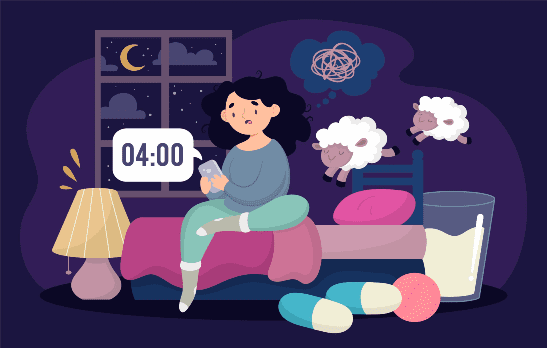29 August 2023 | Tuesday | News

Image Source | Public Domain
Insomnia is a sleep disorder with difficulty falling asleep or staying asleep, early awakening and so on. It is also the most common complaints in primary care.
The prevalence of difficulty falling asleep is reported to be 8.3% of the Japanese population and, for insomnia as a whole, 21.4%1. Insomnia is considered to be a socially important issue affecting patients’ quality of life, as prolonged insomnia is a factor that increases the risk of developing psychiatric disorders such as depression and anxiety disorders.
Currently, in the treatment of insomnia in Japan, drug therapy with sleeping pills is widely used2. Although sleeping pills have the advantage of immediate effects, such as shortening the latency to fall asleep and improving difficulty staying asleep, they have kinds of side effects such as physical symptoms of lightheadedness or falling down, and carryover effects of headache or fatigue. They also cause drug dependence. Thus, it is required to use the minimum necessary amount of sleeping pills.
In addition to drug treatment, there are other treatment options like sleep hygiene instruction or cognitive behavioral therapy for insomnia (CBT-I). They are selected based on the patients’ symptoms, and in the United States, CBT-I is recommended as the first choice for insomnia treatment3. However, implementing CBT-I requires time-consuming instruction, and CBT-I is not widely used in Japan due to a lack of medical professionals.
New treatment option for insomnia with this app
As mentioned above, drug therapy with sleeping pills is the preferred treatment for insomnia in Japan. Considering this situation, academic societies and the MHLW have proposed reducing the number of pills and the duration of prescriptions, but the number of treatment options has not increased, and the underlying problem remained.
With this regulatory approval, the product can provide with CBT-I to be prescribed in the form of a smartphone application, and it becomes a treatment option for insomnia other than drug therapy. SUSMED entered into a marketing alliance agreement with Shionogi & Co. in December 2021 in order to widely promote the product to medical institutions4. It is expected to improve the current situation where CBT-I is not widely used due to the shortage of medical professionals, and to enable treatment of insomnia while reducing reliance on drug therapy. In the U.K., where evidence for the treatment of insomnia with smartphone applications has been accumulated, the National Institute for Health and Clinical Excellence (NICE) has recommended the use of CBT-I based applications for insomnia treatment in its 2022 guidelines5.
© 2026 Biopharma Boardroom. All Rights Reserved.